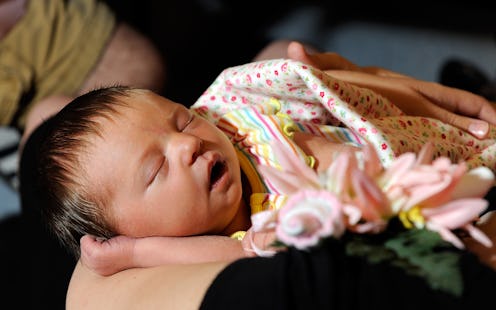News
First Comes Baby, Then Comes Marriage?

Four years ago, TIME magazine asserted that modern marriage is a changing institution, and the hoopla over whether marriage is still viable — at least the way that we've come to know it — continues to be debated by social scientists and Joe Schmoes alike. Marriage rates were at an all-time low last year and will likely continue to decline. Now, however, research is beginning to examine the effect of this phenomenon — if it exists or not — on parenthood. New analysis shows that most American mothers between 26 and 31 are not married, causing all kinds of questions about whether putting a ring on it will even continue to be part of the whole first-comes-love-then-comes-marriage-then-comes-baby-in-a-baby-carriage deal.
However, breaking down the numbers indicates certain trends across specific social groups. Researchers used data from the National Longitudinal Survey of Youth, which interviewed 9,000 millennials yearly from 1997 to 2011. They discovered that not only do women who have less education have more children on average, but that these women are much less likely to be married to, or cohabiting with, the fathers. Take a look at the graphs below, which are from the Johns Hopkins University study.
Births Among Women Who Did Not Finish High School
Only a quarter of these mothers, who represent 28 percent of all births in the group studied, are married. For those that are not, TIME says that there's a high chance that the relationship may end in the difficult years following the birth of a child. That leads to "multi-partner fertility," or mixed families with several different parental figures.
Births Among Women Who Finished High School
Of the mothers who finished high school, 71 percent had a baby while unmarried. However, there's a 15 percent increase of married mothers in this group.
Births Among Women Who Finished Four Years of College
Here's where the difference gets obvious. Women who finished college are far more likely to be married when they have a baby. At 71 percent, that group is more than double both the cohabiting and unattached groups combined.
So what's the reasoning behind this shift? It's probably a combination of several social factors:
- Marriage really is a declining institution, but only for those who don't have much education. It's even been dubbed a "luxury good" by writers like The Atlantic's Jordan Weissman.
- Marriage used to be a prerequisite for other important adulthood steps, like getting a well-paying, satisfying job and, yes, having kids. Now, it's the other way around: marriage is a kind of "capstone" that crowns a millennial's other achievements.
- It's common sense that those without a high level of education don't make a lot of money. When a woman is poorer, it's harder to plan out childbearing and get/use effective birth control. I mean, if someone is worried about paying for groceries, is she really going to pay for condoms before food? And is she going to have access to health care and information about her reproductive health?
There are plenty of other explanations, but those seem like the most plausible to me. And whether you see this change in marriage and child-raising habits as spelling out doom for our morality, freeing for American women, or as something in between, what won't change is the fact that this is happening in the first place. Because of patterns like assortive mating, these kinds of differences among education/income groups may just perpetuate themselves.
Images: Department of Sociology/Johns Hopkins University